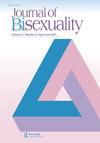与女性和男性发生性行为的年轻黑人女性避孕自我效能和避孕套使用的预测因素
IF 1.9
Q2 SOCIAL SCIENCES, INTERDISCIPLINARY
引用次数: 0
摘要
摘要与女性和男性发生性关系的黑人女性(BWSWM)有计划外怀孕、人类免疫缺陷病毒(HIV)和其他性传播感染(STIs)的风险。然而,很少有研究评估这一人群中与性风险相关的心理社会因素。本研究调查了安全套使用之间的关系;避孕自我效能;女同性恋、男同性恋和双性恋(LGB)身份;性与宗教冲突;家长对参与者吸引女性的支持;以及对一项在线调查做出回应的162名参与者样本中的LGB社区支持。参与者为顺性别女性(n = 152)和出生时被分配为女性的性别酷儿或性别非二进制参与者(n = 10) 年龄18至35岁。分层线性回归分析表明,LGB身份、低性宗教冲突和更大的父母支持预测了避孕自我效能,而更大的避孕自我效能反过来又介导了这些因素与避孕套使用增加之间的关系。考虑了在研究和临床环境中与这一人群合作的意义。本文章由计算机程序翻译,如有差异,请以英文原文为准。
Predictors of Contraceptive Self-Efficacy and Condom Use Among Young Black Women Who Have Sex With Women and Men
Abstract Black women who have sex with women and men (BWSWM) are at risk for unplanned pregnancies, human immunodeficiency virus (HIV), and other sexually transmitted infections (STIs). However, there is a paucity of studies assessing psychosocial factors related to sexual risk in this population. This study investigated the relationship among condom use; contraceptive self-efficacy; lesbian, gay, and bisexual (LGB) identity; sexuality-religious conflict; parent support for participants’ attraction to women; and LGB community support within a sample of 162 participants who responded to an online survey. Participants were cisgender women (n = 152) and genderqueer or gender-nonbinary participants who were assigned female at birth (n = 10) aged 18 to 35. Hierarchical linear regression analyses indicated that LGB identity, low sexuality-religious conflict, and greater parent support predicted contraceptive self-efficacy and, in turn, greater contraceptive self-efficacy mediated the relationship between these factors and increased condom use. Implications for work with this population in research and clinical contexts are considered.
求助全文
通过发布文献求助,成功后即可免费获取论文全文。
去求助
来源期刊

Journal of Bisexuality
SOCIAL SCIENCES, INTERDISCIPLINARY-
CiteScore
2.60
自引率
17.60%
发文量
32
期刊介绍:
The Washington Quarterly (TWQ) is a journal of global affairs that analyzes strategic security challenges, changes, and their public policy implications. TWQ is published out of one of the world"s preeminent international policy institutions, the Center for Strategic and International Studies (CSIS), and addresses topics such as: •The U.S. role in the world •Emerging great powers: Europe, China, Russia, India, and Japan •Regional issues and flashpoints, particularly in the Middle East and Asia •Weapons of mass destruction proliferation and missile defenses •Global perspectives to reduce terrorism
 求助内容:
求助内容: 应助结果提醒方式:
应助结果提醒方式:


